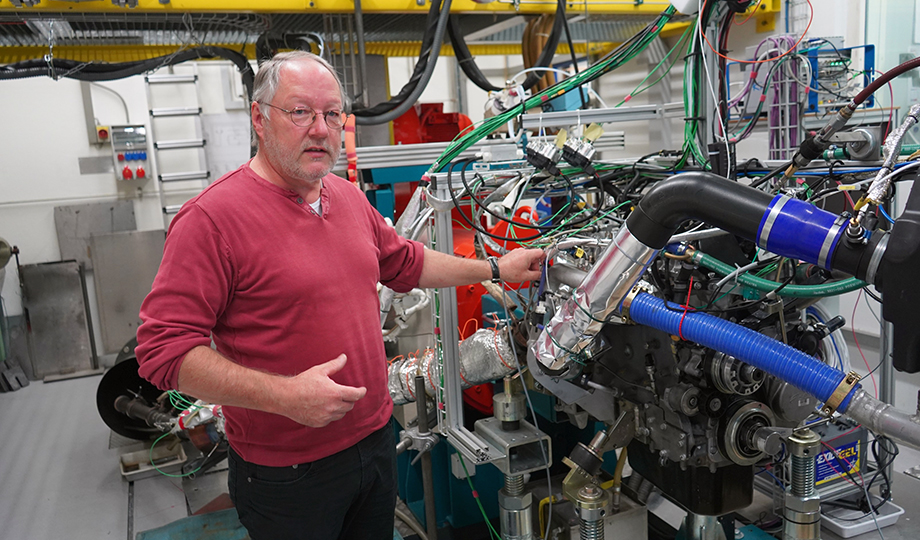Christian Bach: "Synthetic fuels are needed on a large scale".
BACKGROUND For many, the ban on internal combustion engines cannot happen fast enough. This ignores the fact that the climate target for 2050 cannot be achieved with the electrification of car drives alone.

According to electrolysis plant manufacturer Thyssen Krupp, more than 100 pilot projects for the production of green hydrogen are already underway in the USA, Brazil, the Netherlands and Saudi Arabia. AUTOINSIDE, the Swiss trade magazine for garage owners, spoke with Christian Bach, head of the Vehicle Propulsion Systems department at Empa in Dübendorf, one of the most renowned experts on alternative propulsion systems.
What scenario of drives do you envision for 2035?
Christian Bach: In Switzerland, a high electric share could be possible, but in large parts of Europe this is more unclear due to the partly much worse power grids. In 2019, a study by the University of Geneva and the BKW network showed that in Switzerland alone, investments of eleven billion francs would be needed to upgrade the already good distribution networks. Elsewhere, the need for expansion is greater. I therefore assume that a drive mix will be offered throughout Europe even for passenger cars after 2035. And for commercial vehicles anyway.
Why are politicians and the automotive industry focusing primarily on electric vehicles?
Due to the planned strong expansion of renewable electricity production, the switch to direct use of electricity wherever possible makes sense and is logical. However, it is not the case that politics and the automotive industry are focusing on e-mobility alone. There are many programs for hydrogen as well as for synthetic or biogenic fuels. The EU, for example, is discussing ambitious blending rates.
Do we need synthetic fuels for climate protection?
According to the Energy Perspectives 2050+ of the Swiss Federal Office of Energy, the decarbonization of road transport in Switzerland in 2050 will require roughly the same amount of synthetic fuels as renewable electrical energy - namely around 15 terawatt hours, or TWh, or 1.5 billion liters of diesel equivalent each year. Added to this is air traffic with a further 15 to 20 TWh. In addition, synthetic fuels will probably also be indispensable for the decarbonization of industrial high-temperature processes - around 20 TWh today.
The answer is therefore: Yes, synthetic fuels are needed - on a grand scale. They may be inefficient to produce, but they are still necessary because the world does not have an energy problem, but a CO2 problem. They are made from hydrogen and CO2. When they are used, only as much CO2 is produced as was previously drawn from the atmosphere for their production. The decisive factor is how the hydrogen is produced. If renewable energy is used for this, a high CO2 reduction results. If the hydrogen is produced using fossil fuels, it can be driven using fossil fuels. But that is also the case with electricity for electromobility.
The EU is planning a ban on internal combustion vehicles. Is that the right way to go?
Yes, if this path is followed to its conclusion. As I said, I consider it unlikely that a 2035 ban on internal combustion vehicles in Europe is fully feasible. However, to achieve the 2050 target, given the typical vehicle lifetime of 15 years, it will be necessary for no vehicles using fossil energy to be on the road after 2035. In addition, the world's fleet of 1.4 billion internal combustion engine vehicles must move away from fossil fuels. We can no more achieve the CO2 targets with electromobility alone than with synthetic fuels alone. That's why we need both.
Can production be increased at a reasonable energy cost?
Mobility based on synthetic fuels is about as expensive as electromobility. This means that synthetic fuels could be launched on the market with the same measures - i.e. the creditability of CO2 reduction and mineral oil tax and HVF exemption during the market launch. Technologically and energetically, practically everything is ready for the industrial production of synthetic fuels. However, investment security is still lacking. This is about to change, however, with the European requirements for a blending quota. We assume that synthetic fuels will be produced in the Earth's sunbelt. There, solar radiation is twice as high per square meter of surface area, and there are huge areas of unused land.
Do you see a diesel future - and what role does biogas play as a fuel?
Without renewable fuels, combustion engines have no future - however, there are applications in long-distance and load operation where diesel engines cannot be dispensed with for decades to come. These applications must not remain fossil if we want to achieve the climate targets. Biogas is a more complex but often underestimated energy resource. There are few more impressive upcycles than converting green waste and manure into fuel. Biogas is currently experiencing a boom in the commercial vehicle sector, but is being held back by rigid HVF regulations.









